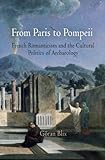From Paris to Pompeii : French Romanticism and the Cultural Politics of Archaeology / Göran Blix.
Material type: TextPublisher: Philadelphia : University of Pennsylvania Press, [2013]Copyright date: ©2009Description: 1 online resource (320 p.) : 16 illusContent type:
TextPublisher: Philadelphia : University of Pennsylvania Press, [2013]Copyright date: ©2009Description: 1 online resource (320 p.) : 16 illusContent type: - 9780812241365
- 9780812201307
- 930.10944 22
- CC101.F8 B55 2009eb
- online - DeGruyter
- Issued also in print.
| Item type | Current library | Call number | URL | Status | Notes | Barcode | |
|---|---|---|---|---|---|---|---|
 eBook
eBook
|
Biblioteca "Angelicum" Pont. Univ. S.Tommaso d'Aquino Nuvola online | online - DeGruyter (Browse shelf(Opens below)) | Online access | Not for loan (Accesso limitato) | Accesso per gli utenti autorizzati / Access for authorized users | (dgr)9780812201307 |
Frontmatter -- Contents -- Illustrations -- Introduction -- Chapter One: Neoclassical Pompeii -- Chapter Two: The Antiquarian Comes of Age -- Chapter Three: The Archaeological Turn -- Chapter Four: The Specular Past -- Chapter Five: Body Politics -- Chapter Six: Lost Worlds and the Archive -- Chapter Seven: The Uses of Archaeology -- Notes -- Bibliography -- Index -- Acknowledgments
restricted access online access with authorization star
http://purl.org/coar/access_right/c_16ec
In the early nineteenth century, as amateur archaeologists excavated Pompeii, Egypt, Assyria, and the first prehistoric sites, a myth arose of archaeology as a magical science capable of unearthing and reconstructing worlds thought to be irretrievably lost. This timely myth provided an urgent antidote to the French anxiety of amnesia that undermined faith in progress, and it armed writers from Chateaubriand and Hugo to Michelet and Renan with the intellectual tools needed to affirm the indestructible character of the past.From Paris to Pompeii reveals how the nascent science of archaeology lay at the core of the romantic experience of history and shaped the way historians, novelists, artists, and the public at large sought to cope with the relentless change that relegated every new present to history.In postrevolutionary France, the widespread desire to claim that no being, city, culture, or language was ever definitively erased ran much deeper than mere nostalgic and reactionary impulses. Göran Blix contends that this desire was the cornerstone of the substitution of a weak secular form of immortality for the lost certainties of the Christian afterlife. Taking the iconic city of Pompeii as its central example, and ranging widely across French romantic culture, this book examines the formation of a modern archaeological gaze and analyzes its historical ontology, rhetoric of retrieval, and secular theology of memory, before turning to its broader political implications.
Issued also in print.
Mode of access: Internet via World Wide Web.
In English.
Description based on online resource; title from PDF title page (publisher's Web site, viewed 24. Apr 2022)


